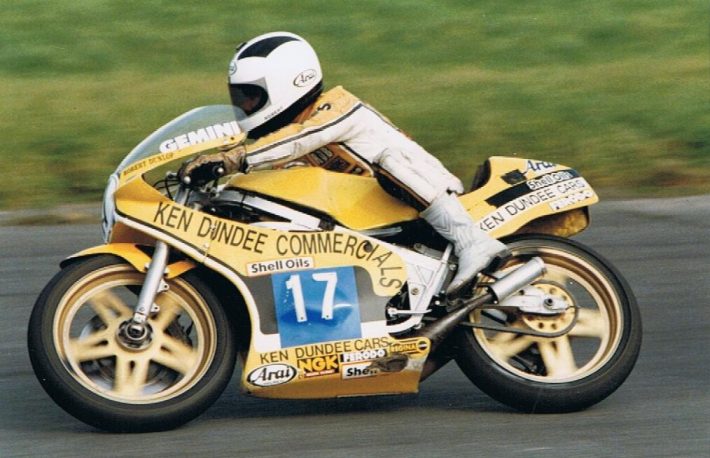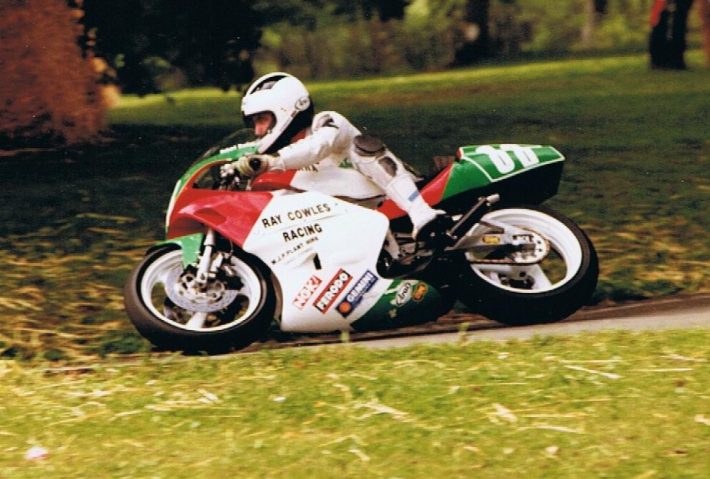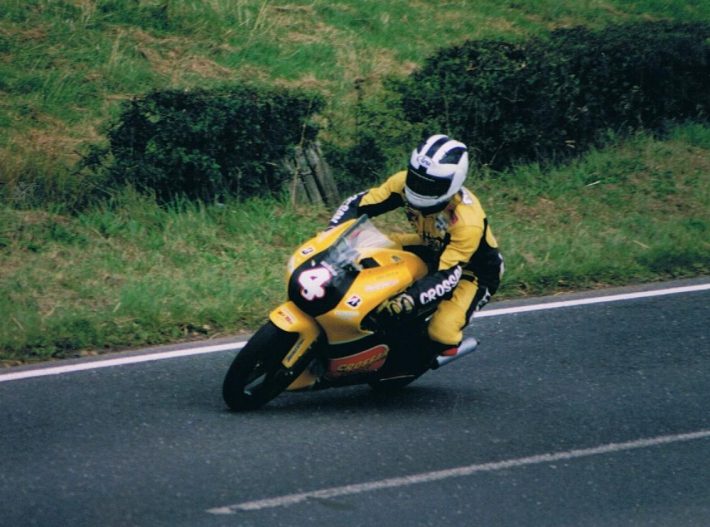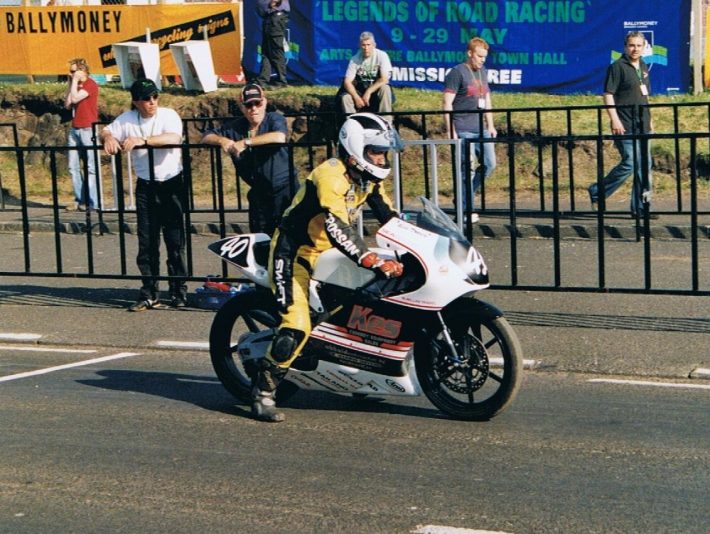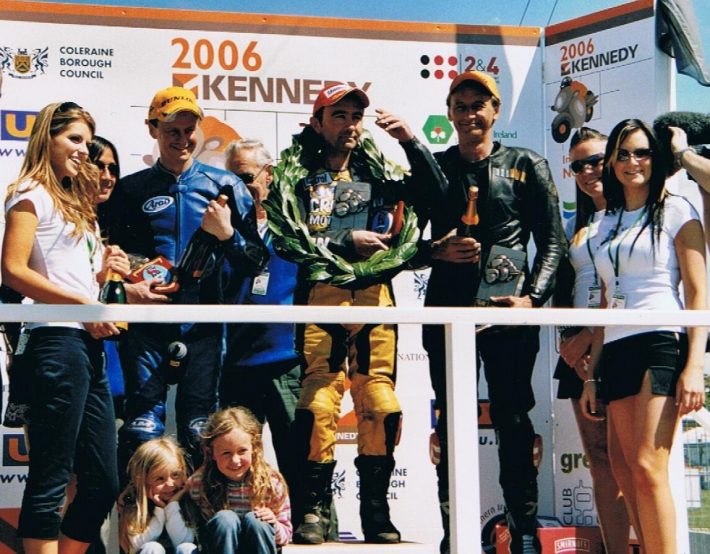Robert Dunlop was one of the most successful road racers of his generation and although he had to contend with having the tag of being the brother of the greatest road racer there ever was in Joey Dunlop, he was a star in his own right.
Often tagged as a 125cc specialist which he certainly was, as seen by his British title, Robert could ride any machine on any circuit and his performances on the Superbikes were equally praiseworthy and stunning, if not more so given his diminutive stature.
Having started out on short circuits, Robert made his debut on the roads at the 1979 Temple 100 and it didn’t take long for the wins to flow with his single-mindedness, tenacity and determination well to the fore, traits that he would need every single ounce of as he fought back from serious injury on more than one occasion.
15 wins at the North West 200, nine at the Ulster Grand Prix, five at the Isle of Man TT and one at Macau, his tally of wins would surely have been more had it not been for the horrific injuries he received at the TT in 1994, injuries that would never fully heal.
Against all odds, he continued to race, and continued to win but, like Joey, tragedy would strike as Robert Dunlop lost his life in practice for the 2008 North West 200, ironically the venue that had given him the most success.
We take a look at some of his finest moments.
1983 – Newcomers Manx Grand Prix victory
Unlike brother Joey, eight years his elder, who went straight to the Isle of Man TT races, Robert opted for the Manx Grand Prix to make his debut around the 37.73-mile Mountain Course with the 1983 350cc Newcomers race the chosen event.
Having finished second quickest in practice behind Ian Newton, Robert took command of proceedings on the first of the four laps to lead a certain Steve Hislop by 18.8s and with the fastest lap of the race on lap two, 105.29mph, he stretched his lead over the Scot to 42 seconds.
Aged just 22 at the time, Robert increased his lead even more on lap three and although Hislop reduced the deficit on the fourth and final lap, the damage had been done and the young Dunlop won on the Mountain Course at his very first attempt.
His eventual winning margin was just over a minute and in what would prove to be an illustrious podium, probably the greatest in the Manx Grand Prix’s history, Welshman Ian Lougher came through to take third.
The trio of Dunlop, Hislop and Lougher would go on to amass a superb total of 26 TT wins and 61 podiums.
1986 – First North West 200 victory
By 1986, Robert had become a regular winner at both the Irish National road races and short circuit events, with wins also being taken at Oliver’s Mount, Scarborough but he’d yet to really make his mark at the International races,
Two years at the TT had yielded a best finish of sixth in the 1985 Production C race whilst his best finish at the Ulster GP had been a ninth in the ‘85 350cc race.
The North West 200 had been equally sparse with seventh in the 1984 350cc race the best of his efforts but that would all change in the same race two years later.
Gene McDonnell, who had finished fifth in the Newcomers Manx Grand Prix that Robert had won in 1983, led in the early stages and opened up a formidable looking five second lead by half race distance.
The race had started damp with McDonnell on a wet front and intermediate rear but as the race wore on, the track began to dry and Robert’s choice of an intermediate front and slick rear came into their own.
It wasn’t until the final lap that he hit the front for the first time, taking the lead at Church Corner and although McDonnell retaliated at the Juniper Chicane, Robert had better grip and drive on the run to the line and he got the verdict by one fifth of a second.
He also set the fastest lap of the race at 111.78mph on his way to taking the first of his 15 NW200 victories.
Credit: Phil Wain’s Family Archive
1989 – First Isle of Man TT win
The joy of taking his first International win soon disappeared after a crash at the 13th Milestone during the following month’s Formula Two TT race left him with serious injuries although he was back racing just a couple of months later.
It was the first setback in his career but he was back at the TT in both 1987 and 1988 with two top six finishes taken in the former before moving into the Superbike category for the latter where he took 12th place in the Senior on his RC30 Honda.
A year later, the 125cc race was re-introduced to the programme for the first time since 1974 and it looked like an ideal opportunity for Robert to challenge for his first TT win particularly as he’d enjoyed some strong results on the small capacity machines in the early 1980s.
Having set the fastest lap in practice at 102.84mph, Robert was favourite for the two lap race although his old foes from the Manx Grand Prix, Lougher and Newton, weren’t too far adrift.
However, he was never headed and after leading by almost ten seconds after the first lap, a new lap record of 103.02mph helped him claim his first TT win with his eventual winning margin over Lougher being 15.8s.
1989 – Macau Grand Prix victory
Despite his small stature, Robert had by now established himself as one of the most versatile riders on the roads and 1989 saw him take his first Superbike podium at the North West 200 with fourth place finishes having also been claimed at the North West 200 and Senior TT.
It was the Macau Grand Prix though that saw him stand on the podium for the first time in an International Superbike race when he took third overall in 1988 behind Kevin Schwantz and Peter Rubatto.
The Far East venue again had a stellar line up for the 1989 meeting with Hislop on the factory RC30 Honda, Phillip McCallen, Eddie Laycock, Roger Bennett, John Reynolds, Ian Simpson and Ray Swann just some of the leading riders in the field.
Bad weather and fading light meant the race was held over a solitary leg of eight laps, instead of the usual two 15-lap affairs, and conditions were extremely tricky but in parallels to brother Joey who used to thrive in such conditions, Robert seized the initiative.
He went on to take victory on his RC30 Honda with the similarly mounted McCallen and Hislop in second and third.
1990 – First NW200 hat-trick
Robert’s eye-catching performances brought him to the attention of the JPS Norton team and they signed him as team-mate to Trevor Nation for the 1990 International road racing season, ironically replacing fellow Ulsterman Steve Cull in the team.
He would also continue to campaign the 125cc PJ O’Kane Honda and with the North West 200 again the first International road race of the season, all eyes were on Dunlop and the fire-breathing Norton especially as brother Joey was back racing as he continued his comeback from injuries sustained at Brands Hatch the previous year.
The opening Superbike race set the trend for the day and whilst Joey was an early retirement due to an oil leak, there was no stopping Robert at the head of the field.
World Formula One Champion Carl Fogarty did his utmost to stay in touch but although he briefly led, Robert responded immediately and with a new lap record of 120.86mph he won by seven seconds to take his first win of the day.
Next up was the 125cc race where things were a lot different as he fought tooth and nail with Alan Patterson for the entire race distance.
No more than a few feet separated the dicing duo and although Robert set another new lap record of 103.48mph, it was a missed gear for Patterson that allowed him to make a break and make it win number two.
That just left the feature Superbike race and although Fogarty roared off the line, his lead was short lived and by lap three, Robert was surging clear once more.
Another new lap record, this time of 121.04mph, saw him romp to victory to take the first of an amazing four NW200 hat-tricks.
Credit: Phil Wain’s Family Archive
1991 – 125cc-250cc TT double
With podiums at the TT and Ulster GP to back up his NW200 success, 1990 was an excellent year on the JPS Norton and it was little surprise to see Robert remain with the team for 1991.
It was going to be a busy year though because as well as a 125cc Honda, this time with John Kennedy as the main sponsor, Ray Cowles supplied Robert with a new 250cc Yamaha.
His season started in superb fashion with his second successive hat-trick at the North West 200 but he arrived at the TT in some discomfort as he was knocked off at the final corner of the final lap in the preceding 125cc British Championship race at Donington Park suffering a broken collarbone.
It put his participation for the event in serious doubt but whilst the injury proved too much for the Formula One and Superbike races on the Norton, he was able to compete strongly in the smaller capacity races. Indeed, he topped the 125cc practice leaderboard but it was brother Joey who led on lap one by a commanding 22 seconds and although Robert reduced the deficit on lap two, the gap was still 19.8s as they came into the pits at half race distance.
However, a slow stop for Joey handed the initiative to Robert and he grabbed the opportunity with both hands, taking the lead on lap three.
It was still tight though and as they went into the fourth and final lap, Robert’s advantage was just 4.4s but he really flew on the final 37.73 miles and with a new lap record of 106.71mph, he took the chequered flag by 39.4s to complete a hat-trick of 125cc TT wins.
The Junior 250cc race followed and despite having his first 250cc outing at the TT for three years, Robert was on the pace throughout the fortnight and he slotted into third place behind Phillip McCallen and Brian Reid at the end of lap one.
Positions remained the same on lap two but a superb pit stop by Robert’s team enabled him to grab the lead and at the end of the penultimate lap, he was 5.6s clear of Reid.
The latter crashed at Handley’s Corner on the final lap and although McCallen set the fastest lap of the race, Robert held on to complete the double, his winning margin on this occasion 4.8s.
1991 – 125cc British Champion
The move to Norton meant that Robert was now competing regularly on the mainland but he was still able to compete in the 125cc class and took a fine fourth place overall in the 1990 British Championship after taking podiums at Mallory Park, Donington Park and Snetterton.
He was determined to improve the following year and made a concerted effort to take the title with the season getting off in perfect fashion with victory at Snetterton from Rob Orme and Ian McConnachie.
He was on course for win number two at the second round at Donington Park before being knocked off by Orme on the last lap.
Undeterred, he bounced back and went on to dominate the series with victory at the four remaining rounds meaning in won all five of the six races he finished.
It gave him a commanding 31 point advantage over nearest rival Chris Palmer and gave him a fully deserved British Championship.
The following year would further prove his short circuit credentials as he finished second and fifth in the two main Superbike Championships with a victory coming at Cadwell and eight podiums taken in total.
Credit: Phil Wain’s Family Archive
1994 – Fourth NW200 hat-trick
The 1994 season saw Robert sign for Medd Racing to ride one of the all-new RC45 Honda’s in the Superbike class whilst Padgetts Racing supplied him with a 250cc Yamaha and 125cc Honda although he was out of luck on the 250 at the North West 200, retiring from both races.
The early days for the RC45 weren’t all plain sailing as success was hard to come by in both the World and British Superbike Championships mainly due to the handling but Robert gritted his teeth when he came to the roads and it would be he who gave Honda their first International victory for the RC45 as he dominated both Superbike races at the North West.
The first Superbike race saw some terrific action as young pretenders David Jefferies and Michael Rutter set the pace but they soon dropped out and Robert took control eventually winning the race from Iain Duffus, Phillip McCallen the next best RC45 in third.
Race two followed a similar pattern with Jefferies and Rutter again going out early and Robert completed his fourth hat-trick at the meeting, the two Superbike wins sandwiching his victory – again – in the 125cc race.
It was another dominant display on the little Honda and whilst Kevin Mawdsley and Phelim Owens disputed second, Robert disappeared into the distance before easing off in the closing stages to win by more than five seconds.
It took him to 14 wins at the event to cement his status, at the time, as the most successful rider ever at the North West 200.
1998 – 125cc TT win
Less than a month after his NW200 success, Robert suffered a 130mph crash at the TT when the rear wheel of his RC45 collapsed as he was leaving Ballaugh village leaving him with multiple injuries particularly to his arm and leg.
After a long stay in hospital, he returned to racing in 1996 but he was far from fit as the accident had left him with severe tendon damage in his wrist and a shortened leg, both of which restricted him heavily on the bike.
It also ended his Superbike career and he was now restricted now to just competing in the 125cc class but he made his return to the TT in 1997 where he took an excellent third place and a year later he was ready to challenge for the win as he got more used to his restricted and altered riding style.
However, another big crash, this time at the North West 200 left him severely battered and bruised and with a cracked bone in his leg so it was touch and go if he’d make the TT.
In true Dunlop style though, he did exactly that and slightly inclement conditions, which saw the race cut from four laps to three, made his task a little bit less arduous.
An opening lap of 106.93mph on the O’Kane Honda gave him a 11.1s lead over Gavin Lee and he extended his advantage over the Yamaha rider to 22.3s after a second lap of 107.47mph prior to his pit stop for fuel.
Lee retired at the pits which gave Robert more breathing space and although Ian Lougher set the fastest lap of the race on the third and final lap at 107.53mph, Micro had it all under control and duly took his fifth TT win by just under 18 seconds famously throwing his crutches into the crowd at the prize giving at the Villa Marina later that evening.
Credit: Phil Wain’s Family Archive
2006 – 15th and final NW200 win
At the end of 2004, Robert decided to withdraw from racing in order to have further operations on his leg which was still causing him considerable pain and discomfort ten years on from the TT accident.
He missed the entire 2005 racing season but returned in 2006 where he was determined to get back onto the top step at the North West 200 having not tasted victory there since 1994.
Former 125cc British Champion Michael Wilcox grabbed the lead on the opening lap and it looked like the Lincolnshire rider would take a relatively comfortable win as he gradually pulled away.
However, Dunlop had been slowed when a 400cc rider crashed in front of him and had dropped back to fourth and was working his way back through the field.
Robert eventually moved up to second but going into the final lap he was still three seconds adrift of Wilcox.
Amazingly, by the time they got to the Magic Roundabout, Dunlop was in the lead only for Wilcox to hit back at the Metropole.
Robert wasn’t to be out done though and dived up the inside at the Juniper Chicane and although he went in too hot and onto the grass, he managed to keep it all together and beat Wilcox in the dash to the line by 0.193s.
It was his 15th win at the event and his first in 12 years and although Wilcox got his revenge a year later, Robert was on the podium again in second.
Credit: Phil Wain’s Family Archive
For 2008, Dunlop added a 250cc machine to his stable of machinery for the first time in 14 years as he felt his arm was strong enough to compete in the quarter litre category but, sadly, it ended in tragedy.
Robert Dunlop’s tragic death in 2008
On Thursday 15 May 2008 when competing at his favourite North West 200 event, Robert died after suffering severe chest injuries in a crash during the second qualifying session.
The accident happened as the riders approached the Mather’s Cross section of the course and when the Honda’s engine seized, Dunlop mistakenly grabbed the front brake, which was situated beside the clutch on his specially modified bike.
He was subsequently thrown over the handlebars at approximately 160 mph and, after being hit by a following rider who was unable to avoid him, he succumbed to his injuries later that evening.
His funeral took place three days later at Garryduff Presbyterian Church in his home town of Ballymoney and he was laid to rest beside his brother, Joey.

